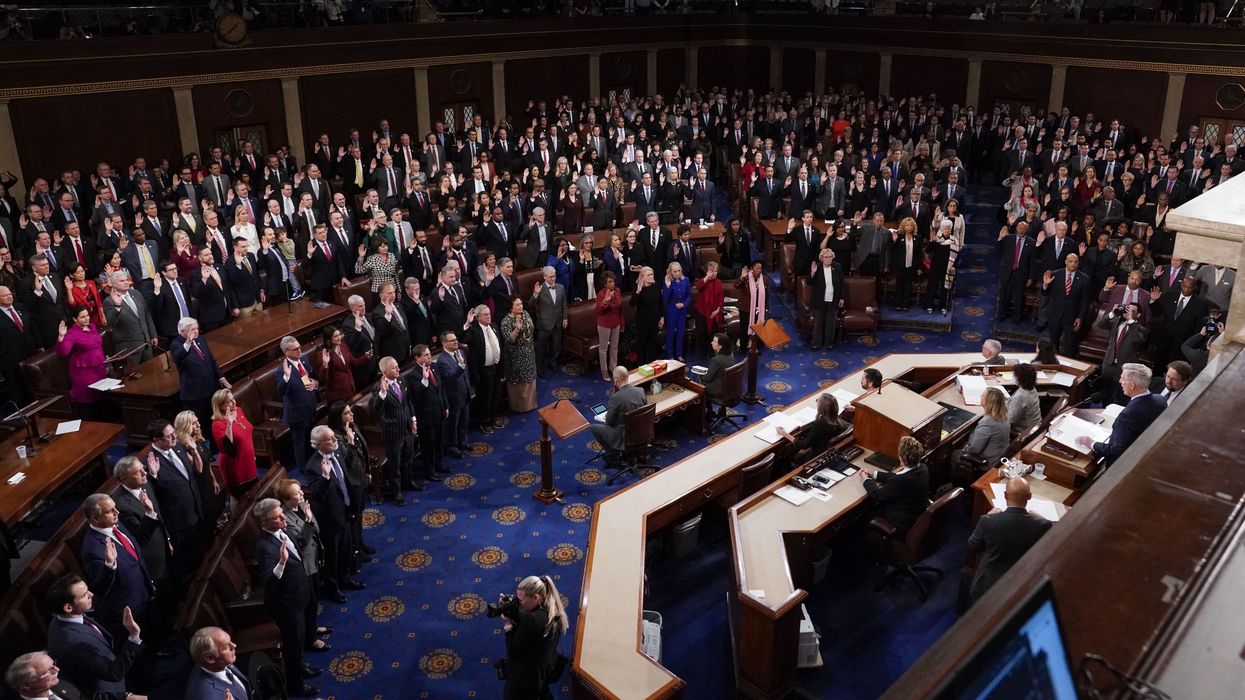Wirls is a professor of politics at the University of California, Santa Cruz.
For most of the nation’s history, members of the U.S. House of Representatives have been addressed as “Congressman” or “Congresswoman.” By contrast, a senator is referred to as, well, “Senator.”
These gendered terms for House members dominate in journalism, everyday conversation and among members of Congress.
The name Congress refers to the entire national legislature, composed of the House of Representatives and the Senate. Gender identity aside, congressman and congresswoman are fundamentally inaccurate terms.
In the Constitution, Congress refers to the legislative branch as a whole. When discussing the membership of Congress, the Constitution uses “Representatives” and “Senators,” but also “Members” in reference to both. “Congressman” is nowhere in that founding document.
One of the foremost scholars of Congress, the late Richard Fenno, wrote, “a House member’s designation, as prescribed in the U.S. Constitution, is not Congressman, it is Representative.”
As a scholar of Congress and particularly the Senate, I am interested in the differences between the two chambers and how that affects American politics. In my investigation of the origins and evolution of congressman and congresswoman, I combed the records of colonial and state legislatures, as well as records related to the country’s founding and newspapers from the end of the 1700s to the mid-1900s.
Even if the current era were not one of justified sensitivity to gender neutrality and diversity, these two terms for House members are not just dated, they are wrong. Representative is the correct but rarely used term.
Historical use
How did this terminological oddity come to be?
Congressman was used as early as 1780 in a poem by a British loyalist to refer to members, formally known as delegates, of the single-chamber and Senate-like national legislatures that preceded the Constitution’s establishment of a two-chamber legislature.
From 1788 onward, the gendered term was sometimes applied to members of Congress in general but increasingly to representatives in particular.
The central linguistic logic at work in early 19th century use of the term congressman stemmed from the reporting of election results. Newspapers reported the choices for governor, lieutenant governor, assemblymen, congressmen and senators. The only elections to Congress, however, were for members of the House, in contrast to senators, who were selected by state legislatures.
So, senators referred not to the occupants of the U.S. Senate but to the state senate. U.S. senators would not be directly elected by citizens for more than a century. In this and similar reporting, it was unambiguous to refer to the election of “congressmen.”
The common usage, which was firmly in place by the end of the 19th century, was bolstered by the arrival of congresswomen, starting with Jeannette Rankin in 1917. That political breakthrough ironically reinforced the gendered terminology associated with this office. The few early congresswomen were eventually joined by the first elected female senator, who was referred to as Senator.
Indeed, senators are invariably referred to by their gender-neutral and constitutional title.
Few parallels elsewhere
The use of titles that are both unnecessarily gendered and inaccurate is almost restricted to the United States Congress. There are surprisingly few parallels and no true equals at the state or international levels.
The gender-neutral term designated in the Constitution already exists. The title Representative is used in certain formal but limited circumstances by journalists and others. For example, the widely used Associated Press style guide for journalists instructs that “Rep. and U.S. Rep. are the preferred first-reference forms when a formal title is used before the name of a U.S. House member.” But the style guide also advises that “congressman and congresswoman are acceptable,” and those terms dominate in most circumstances in print and television journalism.
And the use of congressman and congresswoman dominates even among representatives and senators themselves. Some members even seem to go out of their way to avoid the constitutional term, including Sen. Mitt Romney. Romney recently referred to former President Donald Trump’s communications with “Republican senators and congresspeople.”
And the use of congressman and congresswoman is at odds with other contemporary adjustments to circumvent or replace sexist or binary language, including personal pronouns. The application of gender neutrality through the constitutional title evades neologisms like congressperson, which is as clumsy as it is unnecessary.
Reminder of civic virtue
Even as the Senate has lost some of its prestige and luster, the House is seen as a lower rung on the ladder of U.S. politics. Perhaps the inferiority complex that attaches to membership in the House versus the Senate also encourages the use of congressman. Being a member of Congress – and therefore a congressman or congresswoman – may seem more prestigious in its focus on the institution as a whole.
But it doesn’t have to be that way; the House could instead embrace its official title.
Richard Fenno, quoted earlier, can finish his point: “Whereas ‘congressman’ or ‘congresswoman’ tends to call our attention to a House member’s Capitol Hill activities and to his or her relationship with colleagues,” Fenno wrote, “‘representative’ points us toward a House member’s activities in his or her home district and to relationships with constituents.”
Members relish their connections to their districts, their constituents and the democratic virtues that role conveys. And part of this is the implicit contrast with the Senate, with its undemocratic origins and enduring elitist pretensions.
As well as being gender-neutral and institutionally accurate, the original title is a powerful reminder of the civic virtue and founding purpose of the House of Representatives. It’s not just politically correct, it’s constitutional.![]()
This article is republished from The Conversation under a Creative Commons license. Read the original article.



















Trump & Hegseth gave Mark Kelly a huge 2028 gift